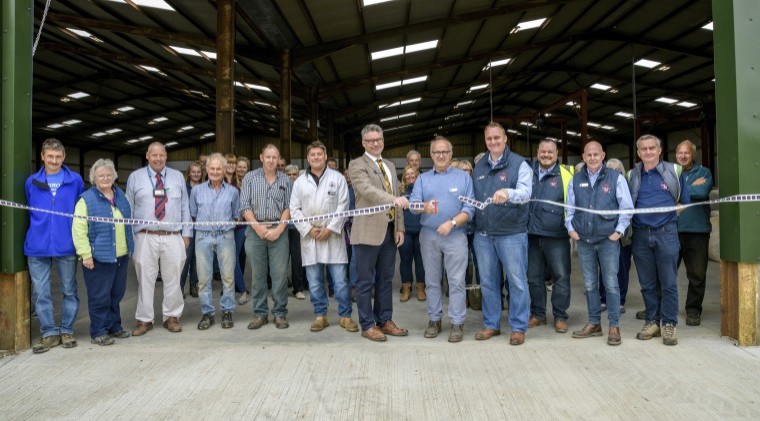The new site, which is situated at Walnut Tree Farm in Smeeth on the outskirts of Ashford, will allow British Wool to continue grading and storing fleeces following the closure of Kent Wool Growers last year and the loss of the Tannery Lane premises.
Welcoming farmers to the depot, Trevor Richards, Ashford-based sheep farmer and chairman of British Wool, stated that the magnificent new building was “a testament to those who have put a huge amount of hard work into getting where we are today”, with thanks being given to the British Wool staff as well as the landlords, Jake and Mark Thompson, who have invested in the building and “have helped as much as they can”.
Looking to the future, Mr Richards is confident that the new depot signifies British Wool’s commitment to growing the wool price and improving the level of service for producers in the region, stating that while “it would have been quite easy to have just walked away” and converted the area into a collection centre, the wool co-operative “was determined to have a grading centre in the South East of England”.
Following the completion of the depot, there will be more capacity for farmers to deliver wool and they will also benefit from more space for tractors and trailers. Producers must telephone the depot in advance to book in their wool deliveries. With the increased storage capacity, the site will be operational 12 months of the year and it is anticipated that the Ashford team be able to handle in excess of 1,000 tonnes of wool per season.
Speaking to South East Farmer at the event, Joe Farren, chief executive officer of British Wool, said that the co-operative was “here for the long-term” and expressed confidence that the wool coming through the depot’s doors would grow in weight over the years with British Wool’s initiatives to grow the price of wool and increase customer service for farmers.
“Some of our finest wools are produced in this part of the country and they are an important part of the national clip,” said Joe Farren. “The new site and its straightforward layout will allow us to be more efficient. Now that we own the business we can also improve the level of service and we are looking into all aspects such as the more widespread availability of bags for customers and greater flexibility around how and when customer wool is collected or dropped. I hope in time that producers will start to see that improvement.”
Through British Wool’s front-end consumer and retail marketing campaign, its brand licencing scheme and the development of new products with manufacturing partners in China (the first one is planned to be unveiled in September 2018), Mr Farren anticipates that the co-operative will be able to generate more demand and therefore higher prices at auction.
To encourage new entrants into the sector, British Wool has this year launched a scheme which will see those who have had sheep for fewer than five years and who have never been registered as a producer with British Wool, paid 100% of their clip value up front for the first two years. As well as helping with cash flow, the scheme will provide a priority intake and grading service allowing young businesses with limited storage the opportunity to get wool off the farm as quickly as possible and be paid quickly.




